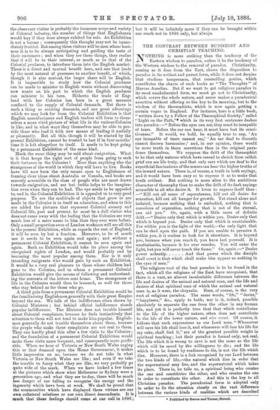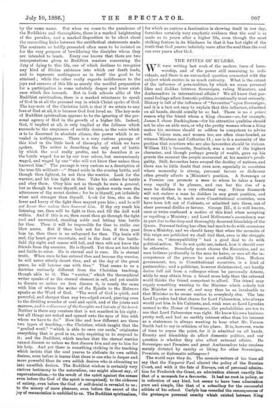THE CONTRAST BETWEEN BUDDHIST AND CHRISTIAN TEACHING.
• Publbbed br Reeves and Turner. Strand.
NOTHING is more striking than the tendency of the Eastern wisdom to paradox, unless it be the tendency of the Western wisdom to the removal of paradox. Christianity, coming as it does from the East, shows the disposition to paradox in its noblest and purest form, while it does not despise that studious temperance, that reconciling genius, which constitutes the charm of such books as "The Thoughts" of Marcus Aurelius. But if we want to get religions paradox in its most unadulterated form, we must go not to Christianity, which covers the whole nature, and never makes a paradoxical assertion without offering us the key to its meaning, but to the wisdom of the theosophists, which is now again getting a certain vogue in England. For instance, here is a little book, "written down by a Fellow of the Theosophical Society," called "Light on the Path,"* which in its very first sentences dashes into paradox :—" Before the eyes can see, they must be incapable of tears. Before the ear can hear, it must have lost its sensi- tiveness." it would, we hold, be equally true to say, 'An eye incapable of tears cannot see," An ear deaf to discords cannot discern harmonies ;' and, in our opinion, there would be more truth in these assertions than in the original para- doxes themselves. We suppose the drift of the theosophist to be that only natures which have ceased to shrink from selfish grief can see life truly, and that only ears which are deaf to the superficial fascinations of the senses can hear the higher truths of the inward nature. There is, of course, a truth in both sayings, and it would have been easy so to express it as to make that truth evident. But nothing is more alien to the ambitious character of theosophy than to make the drift of its dark sayings accessible to all who desire it. It loves to express itself thus : —" Kill out all sense of separateness, kill out all desire for sensation, kill out all hunger for growth. Yet stand alone and isolated, because nothing that is embodied, nothing that is conscious of separation, nothing that is not of the eternal, can aid you." Or, again, with a little more of definite drift :—" Desire only that which is within you. Desire only that which is beyond you. Desire only that which is unattainable. For within you is the light of the world,—the only light that can be shed upon the path. If you are unable to perceive it within you, it is useless to look for it elsewhere. It is beyond you, because when you reach it, you have lost yourself. It is unattainable, because it for ever recedes. You will enter the light, but you will never touch the flame." Or, again :—" Desire
power ardently And that power which the disciple shall covet is that which shall make him appear as nothing in the eyes of men."
The religious root of the best paradox is to be found in the fact, which all the religions of the East have recognised, that there is a vast, an almost incalculable difference between the life and desires of the animal and natural man, and the life and desires of that spiritual man of which the animal and natural man is, as it were, the chrysalis. Here, of course, is the very root of religious paradox. The same words, "life," "desire," "happiness," &c., apply to both; nor is it, indeed, possible absolutely to separate the one from the other in any human life, and yet it is perfectly true that that which contributes to the life of the higher nature, often does not contribute to the life of the lower nature, and vice versa'. Of course, it follows that such expressions as our Lord uses, "Whosoever will save his life shall lose it, and whosoever will lose his life for my sake, shall find it," are of the greatest possible weight in spiritual teaching ; but their paradox is formal only, not real. The life which it is wrong to save is not the same as the life which will be saved by the willingness to die ; and the life which is to be found by readiness to die, is not the life which dies. Moreover, there is a link recognised by our Lord between the two kinds of life,—the natural which dies in order that the supernatural may live, and the supernatural which takes its place. There is, he tells us, a spiritual being who creates the one and constitutes the other, and who creates the one in order to constitute the other. And this is the key to all Christian paradox. The paradoxical form is adopted only in order to fix the attention closely on the vast difference between the various kinds of realities which are described
by the same name. But when we come to the paradoxes of the Buddhists and theosophists, there is a marked heightening of the paradox, and a marked disposition to be silent about the reconciling links between the antithetical statements made. The contrasts so boldly presented often seem to be insisted on for the very purpose of bewildering the disciples whom they are intended to teach. Every one knows that there are two interpretations given to Buddhist maxims concerning the duty of dying to this life, one of which declines to recognise any kind of Divine existence into which our death leads, and to represent nothingness as in itself the good to be attained ; while the other really regards indifference to the joys and sorrows of this life as merely the needful preparation for a participation in some infinitely deeper and truer exist- ence which lies beneath. But in both schools alike of the Buddhist spiritualism, there is a marked reluctance to speak of God in at all the personal way in which Christ spoke of God. The key-note of the Christian faith is that if we attain to any love of God at all, it is because God first loved us. The key-note of Buddhist spiritualism appears to be the ignoring of the per- sonal agency of God in the growth of a higher life. Indeed, God, if implied at all, is only implied as the fullness which succeeds to the emptiness of earthly desire, as the voice which is to be discerned in absolute silence, the power which is re- vealed in nothingness. There is a very curious passage of this kind in the little book of theosophy of which we have
spoken. The writer is describing the only sort of battle by which the soul really profits, and he describes it as the battle waged for us by our true selves, but unconsciously waged, and waged by one "who will not know thee unless thou knowest him." The passage is very curious as a description of the true life militant : —" Stand aside in the coming battle, and though thou 6ghtest, be not thou the warrior. Look for the warrior, and let him fight in thee. Take his orders for battle and obey them. Obey him not as though he were a general, but as though he were thyself, and his spoken words were the utterances of thy secret desires ; for he is thyself, yet infinitely wiser and stronger than thyself. Look for him, else in the fever and hurry of the fight thou mayest pass him ; and he will not know thee unless thou law west him. If thy cry reach his listening ear, then will he fight in thee, and fill the dull void within. And if this is so, then canst thou go through the fight cool and unwearied, standing aside and letting him battle for thee. Then it will be impossible for thee to strike one blow amiss. But if thou look not for him, if thou pass him by, then there is no safegnard for thee. Thy brain will reel, thy heart grow uncertain, and in the dust of the battle- field thy sight and senses will fail, and thou wilt not know thy friends from thy enemies. He is thyself. Yet thou art but finite and liable to error. He is eternal and is sure. He is eternal truth. When once he has entered thee and become thy warrior, he will never utterly desert thee, and at the day of the great peace, he will become one with thee." That seems to us a doctrine curiously different from the Christian teaching, though akin to it. This "warrior," which the theosophical writer speaks of as the eternal element in self, and yet unable to discern us unless we first discern it, is nearly the same with him of whom the writer of the Epistle to the Hebrews speaks as the Word of God. "The word of God is quick, and powerful, and sharper than any two-edged sword, piercing even to the dividing asunder of soul and spirit, and of the joints and marrow, and is a discerner of the thoughts and intents of the heart. Neither is there any creature that is not manifest in his sight : but all things are naked and opened unto the eyes of him with whom we have to do." How like and how different are these two types of teaching,—the Christian, which taught that the "grafted word," " which is able to save our souls," originates everything that is good in us, only requiring us to respond to it; and the Buddhist, which teaches that the eternal warrior cannot discern us unless we first discern him and cry to him for his help. And yet there is something striking in the teaching which insists that the soul yearns to abdicate its own selfish desires, even before it learns that there is one who is deeper and more powerful than its own selfish desires who is educating us into unselfish desires. The Buddhist wisdom is certainly very curious testimony to the naturalism, one might almost say, of supernaturalism,—to the revolt of the spirit against the senses even before the God of the spirit is recognised to the sickness of satiety, even before the God of self-denial is revealed to us ; to the misery of mere pleasure, even before the secret of the joy of renunciation is unfolded to us. The Buddhist spiritualism, for which so curious a fasoination is showing itself in our day, furnishes certainly very emphatic evidence that the soul is so made as to yearn after a higher life, even though the most striking feature in its blindness be that it has lost sight of the truth that God yearns infinitely more after the soul than the soul can ever yearn after God.

















































 Previous page
Previous page